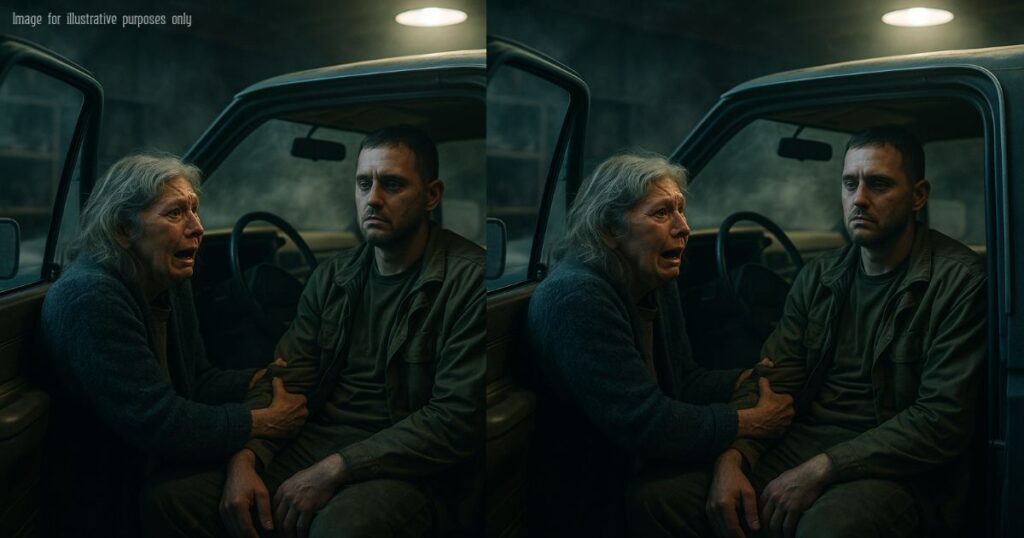The night Tommy cooked dinner for us, I cried in the pantry so he wouldn’t see.
He’d found an old recipe card in Ed’s handwriting—Dad’s chili, the spicy kind that made you sweat and swear but kept you coming back for more. He stood in the kitchen, sleeves rolled up, brow furrowed just like his father used to look when tinkering under the hood of a car.
Jenny and the kids came over early. The little ones sat at the table coloring, while Tommy stirred the pot like it was the most important thing he’d ever done. And maybe, in a way, it was.
That evening, we sat down together. The bowls steamed. The air smelled like memory.
“It’s a little too salty,” he said, embarrassed.
“No,” I smiled. “It tastes like home.”
We ate. We laughed. We told stories.
And then, as I cleared the plates, I heard something I hadn’t heard in years.
Tommy was humming.
It was off-key, low, and slow. But it was music.
That night, after the dishes were done and Jenny packed up the kids, he stood by the door and stared at his reflection in the glass.
“I want to help people again,” he said. “But not like before. Not with a gun. I’ve been thinking… maybe I could work with other vets. Talk to them. Help them find their way back.”
I held his hand. “You already are.”
He started volunteering at the center in Columbus. At first, just folding brochures, stacking chairs. Then someone asked him to share his story. He said no.
Then he said maybe.
Then he did.
And the stories started coming back—not just his, but theirs. Young men with eyes like his. Women with medals and nightmares. They sat in circles. They drank bad coffee. They found words for the unspeakable.
Some days, he came home quiet. Some days, hollow. But other days—more and more of them—he came home lighter. Not whole. But human.
One afternoon, I walked into the living room and saw him sitting cross-legged on the floor, letting his niece braid ribbons into his hair while she babbled about ponies and rainbows.
He caught my eye. Grinned.
“She’s got better aim than the Army ever did,” he joked.
And that’s when I knew.
He was still healing.
But he’d chosen to live.
This past Memorial Day, the town held a small ceremony in the square.
Not a parade. Not pomp. Just neighbors, flags, and a microphone.
They asked Tommy to speak.
He stood in front of the crowd, in jeans and a simple shirt—no uniform, no medals. Just himself.
He didn’t read from paper.
He said, “I went to war thinking I’d fight for my country. I came back needing my country to fight for me. But what saved me wasn’t a program or a speech. It was people. It was my family. My sister. My mother. The ones who kept showing up, even when I couldn’t.”
He paused, looked at me.
“And now… I’m trying to be that person for someone else.”
There wasn’t a dry eye in the square.
Not because he was a hero.
But because he was real.
Now, every morning, I find a coffee cup in the sink and muddy boots by the door. That used to make me worry. Now, it makes me grateful.
He still has rough nights. We both do.
But I keep the porch light on.
And sometimes, when the stars are out and the house is still, I see him outside, looking up—not lost anymore, but remembering.
And I stand beside him.
Because love doesn’t fix what’s broken.
It just refuses to leave.
If someone you love came home changed—if you’re still waiting for the laugh to come back, the light in their eyes—don’t stop loving them.
Even if they push you away. Especially then.
You don’t have to have the right words. Just stay.
Because one day, they might pick up a ribbon, smile, and say,
“Hey, want to braid my hair?”
And in that moment, you’ll know:
They made it back.
Not all at once.
But enough.
🕯️ This story is for every mother who waited, every veteran who still fights at home, and every heart that refuses to give up.
Please share if someone you love is still finding their way.


